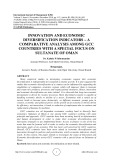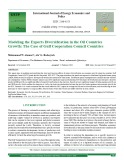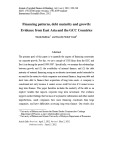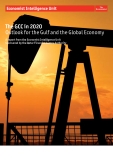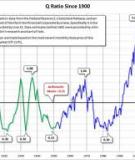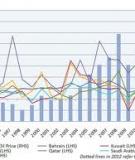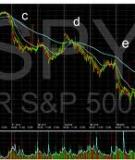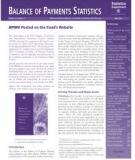
GCC countries
-
Many empirical studies in developing economies suggest that economic diversification is indispensable for sustained economic growth. It is also suggested by studies that economic diversification of a country can be influenced by upgrading the capabilities of companies, scientists, regions which will empower them to innovate and create new products, processes and organizational structures.
 12p
12p  guineverehuynh
guineverehuynh
 18-06-2020
18-06-2020
 17
17
 5
5
 Download
Download
-
This paper aims at modeling and analyzing the short and long run effects of export diversification on economic growth using the countries Gulf Cooperation Council (GCC) panel data for the period 1992-2017. The paper introduces the panel auto regressive distributed lag/pooled mean group (ARDL/PMG) to reach its purpose. The export diversification measured by Theil index.
 11p
11p  partimesinhvien
partimesinhvien
 13-05-2020
13-05-2020
 17
17
 0
0
 Download
Download
-
This paper therefore includes the maturity of the debt as an explicit variable that impacts corporate long term investment. Our evidence supports earlier findings that because of asymmetric information and other market imperfections, small companies face more financing constraints than large companies, and have difficulties accessing long term finance.
 38p
38p  nguyenminhlong19
nguyenminhlong19
 21-04-2020
21-04-2020
 12
12
 0
0
 Download
Download
-
This paper aims at examining the impact of oil price on GCC countries’ stock market returns. We apply wavelet analysis model for examining the relationship between oil and stock market returns. Using monthly data from May 2005 to December 2011, our results suggest that not all stock market in GCC region have a positive relationship with oil price as some have, instead, negative relationship with oil price. Oil price has a negative relationship with Bahrain, Saudi Arabia and United Arab Emirates.
 11p
11p  cothumenhmong4
cothumenhmong4
 24-03-2020
24-03-2020
 45
45
 4
4
 Download
Download
-
The rankings have shown an interesting change in the top five since the beginning of the year, with Qatar and Bahrain completely slipping out of these top rankings, and Lebanon, Jordan and Tunisia taking the second, third and fourth positions, respectively. This is partly due to the use of official GCC population figures in calculating the Facebook penetration rates (as opposed to the ILO figures used for the rest of the countries).
 34p
34p  thamgiacongdong
thamgiacongdong
 02-05-2013
02-05-2013
 42
42
 4
4
 Download
Download
-
The recent boom has focused world attention on the GCC economies—not only as exporters of oil and gas, but as investment destinations with major infrastructure projects, booming tourism and financial services sectors. As US economic growth has slowed, GCC investors have begun to diversify their assets more widely, making investments in Asia, Africa and within the Gulf region itself.
 24p
24p  doiroimavanchuadc
doiroimavanchuadc
 06-02-2013
06-02-2013
 57
57
 4
4
 Download
Download
-
The rationale for using oil price movements as a factor affecting stock valuations is that, in theory, the value of stock equals the discounted sum of expected future cash flows. These cash flows are affected by macroeconomic events that can be influenced by oil shocks. Indeed, oil exports affect the main economic variables in GCC countries: earnings, government budget revenues and expenditures and aggregate demand. So oil price increases should positively affect corporate output and earnings, and then stock returns in these countries.
 23p
23p  quaivattim
quaivattim
 04-12-2012
04-12-2012
 58
58
 3
3
 Download
Download
-
The GCC was established in 1981 and it includes six countries, namely, Bahrain, Oman, Kuwait, Qatar, Saudi Arabia and the United Arab Emirates (UAE). GCC countries share several common patterns. Together, they produce about 20% of all world oil, control 36% of world oil exports and possess 47% of proven reserves. Oil exports largely determine earnings, government budget revenues and expenditures and aggregate demand. Table 1 shows some key financial indicators for the GCC economies. The contributions of oil to GDP range from 22% in Bahrain to 44% in Saudi Arabia.
 14p
14p  quaivattim
quaivattim
 04-12-2012
04-12-2012
 41
41
 2
2
 Download
Download
-
Indeed, as emphasizes by Shiller and Perron (1985) it is not the frequency (number of observations) rather the span (number of years) of the data that is more important to test for random walk hypothesis of economic variables or causal relationships. Secondly, our monthly database which covers twelve years of data only includes four GCC countries out of six and doesn’t permit to draw any conclusion about Qatar and United Arab Emirates which are absent from the database.
 0p
0p  quaivattim
quaivattim
 04-12-2012
04-12-2012
 52
52
 1
1
 Download
Download
-
Our econometric investigation is based on two different complementary (weekly and monthly) datasets, respectively from 7 June 2005 to 21 October 2008, and from January 1996 to December 2007. There are two main reasons for this. Firstly, we think that weekly data may adequately capture the interaction of oil and stock prices in the region better than any other data frequency. However, our weekly data set, which deals with all the six GCC countries, only includes less than four years of data, which can be considered as too short to test for causality....
 11p
11p  quaivattim
quaivattim
 04-12-2012
04-12-2012
 48
48
 3
3
 Download
Download
-
As we can see, the findings of the little available work on GCC countries are contradictory. These findings are puzzling because the GCC countries are heavy oil exporters and have similar economic structures. Furthermore, the GCC economies are oil dependent and are thus sensitive to oil price changes. But previous results are based on country analysis and use time series data from relatively short periods. Our paper differs from previous studies by applying a recent bootstrap panel causality test to examine the relationship between oil and stock markets in GCC countries. ...
 15p
15p  quaivattim
quaivattim
 04-12-2012
04-12-2012
 45
45
 2
2
 Download
Download
-
However, less attention has been paid to smaller emerging markets, especially in the GCC countries where share dealing is a relatively recent phenomenon. Using VAR models and cointegration tests, Hammoudeh and Eleisa (2004) show that there is a bidirectional relationship between Saudi stock returns and oil price changes. The findings also suggest that the other GCC markets are not directly linked to oil prices and are less dependent on oil exports and are more influenced by domestic factors. Bashar (2006) uses VAR analysis to study the effect of oil price changes on GCC....
 20p
20p  quaivattim
quaivattim
 04-12-2012
04-12-2012
 61
61
 2
2
 Download
Download
-
However, the transmission mechanisms of oil price shocks to stock returns in GCC markets should be different from those in net oil-importing countries. Second, the GCC markets differ from those of developed and from those of major emerging countries in that they are largely segmented from the international markets and are overly sensitive to regional political events. Finally, GCC markets are very promising areas for international portfolio diversification.
 17p
17p  quaivattim
quaivattim
 04-12-2012
04-12-2012
 44
44
 2
2
 Download
Download
-
They have also become important international investors and trade partners, and play a crucial role in world energy markets. Indeed, GCC countries are major exporters of oil in global energy markets, so their stock markets may be susceptible to changes in oil prices. However, the transmission mechanisms of oil price shocks to stock returns in GCC markets should be different from those in net oil-importing countries.
 19p
19p  quaivattim
quaivattim
 04-12-2012
04-12-2012
 64
64
 3
3
 Download
Download
-
Using the panel-data approach of Kónya (2006), which is based on SUR systems and Wald tests with country-specific bootstrap critical values, and two different (weekly and monthly) datasets covering respectively the periods from 7 June 2005 to 21October 2008, and from January 1996 to December 2007, we show strong statistical evidence that the causal relationship is consistently bi-directional for Saudi Arabia. In the other GCC countries, stock market price changes do not Granger cause oil price changes, whereas oil price shocks Granger cause stock price changes.
 15p
15p  quaivattim
quaivattim
 04-12-2012
04-12-2012
 57
57
 2
2
 Download
Download
-
This article contributes to the literature by investigating whether or not oil price changes have significantly affected stock market returns in the last years. In fact, during these years price volatility for both crude oil and related products has been great. Unlike most previous papers, which focus on the U.S., European and major Asian stock markets, our paper analyses the impact of oil price fluctuations on Gulf Corporation Council (GCC) markets. These markets are interesting for several reasons. First, GCC countries have attracted increasing attention in recent years.
 13p
13p  quaivattim
quaivattim
 04-12-2012
04-12-2012
 55
55
 3
3
 Download
Download
-
The GCC region is a small but important part of the global economy. Its 2007 real GDP was around US$810 billion, accounting for just 2.1% of the global total 12 . Despite the relatively small size of their economies and populations13 , the rate of GDP growth in GCC countries reached 6.4% in 2007, which is similar to the Asia Pacific average (5% to 6%). Its growth rate exceeded the averages for Latin America, Europe, the OECD and the Middle East. In terms of GDP per capita, Qatar, the UAE, and Kuwait rank among the highest...
 17p
17p  quaivatxanh
quaivatxanh
 01-12-2012
01-12-2012
 55
55
 6
6
 Download
Download
-
It is a young and fast-growing industry that continues to evolve and expand both financially and geographically. This industry’s vast market includes devout Muslims in indigenous Muslim societies as well as in Muslim minorities of non-Muslim countries. Furthermore, it offers a broad appeal beyond its traditional Muslim base: non-Muslim individuals and communities that seek ethical financial solutions have also been attracted to Islamic banking. The first modern Islamic financial institutions emerged in the 1960s and 1970s.
 8p
8p  quaivatxanh
quaivatxanh
 01-12-2012
01-12-2012
 40
40
 5
5
 Download
Download
-
Like other GCC countries, Saudi Arabia, as the world’s largest producer and exporter of oil, has benefitted from increasing oil revenues in recent years. Although Saudi Arabia has not formally established a SWF, its central bank holds a significant amount of international investments outside of traditional foreign reserves, and thus is not reflected on the previous chart. Separately, the Saudi central bank controls an estimated $320 billion in foreign assets, with “additional reserves that are not made public for national security reasons.
 6p
6p  thangbienthai
thangbienthai
 20-11-2012
20-11-2012
 67
67
 2
2
 Download
Download
CHỦ ĐỀ BẠN MUỐN TÌM









